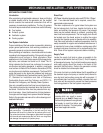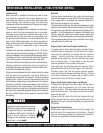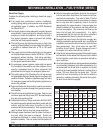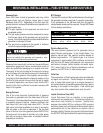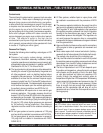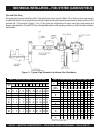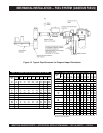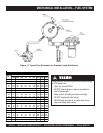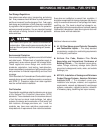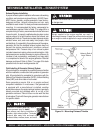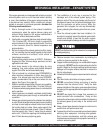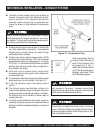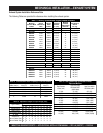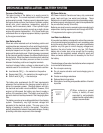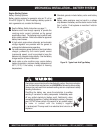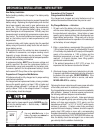
INDUSTRIAL GENERATOR SETS — APPLICATION & INSTALLATION MANUAL — REV. #4 (09/07/07) — PAGE 45
Fuel Storage Regulations
Use extreme care when using, transporting, and storing
fuel. Every measure should be taken to protect personnel
and the environment from the dangers of fuel. Fuel supply
tank design and installation in North America is controlled
by regulations that are generally written for fire protection
and environmental protection. It is very important to adopt
safe methods of storing fuel and to meet all applicable
codes and laws.
Environmental Protection
Environmental protection regulations exist at both federal
and state levels. Different sets of regulations apply to
underground versus above-ground fuel storage tanks.
These regulations cover design and construction
standards, registration, tank testing, leak detection,
closure requirements, preparation of spill prevention plans
and provisions for financial responsibility and trust fund
coverage.
OSHA Standards for Flammable and Combustible Liquids,
exempts above ground installations made in accordance
with NFPA 37. Exemption status from state regulation
must be verified before installation.
Even when an installation is exempt from regulation, it
should be recognized that cleanup expenses may be very
costly for even small amounts of fuel spillage from leaks,
overfilling, etc. The trend in diesel fuel storage for on-
site gensets, both indoors and outdoors, has been towards
Underwriter Laboratories Listed above ground dual-wall
subbase tanks with leak detection.
Additional references include:
z
UL 142, Steel Above-ground Tanks for Flammable
and Combustible Liquids — This safety standard
covers design, construction, and testing requirements
for third-party certification.
z
Uniform Fire Code, Western Fire Chiefs
Association and International Conference of
Building Officials — This standard covers piping,
valves, fittings, stationary storage tanks (above
ground and underground; inside, under, and outside
buildings), etc.
z
API 1615, Installation of Underground Petroleum
Product Storage Systems, American Petroleum
Institute (API) — This standard covers pre-
installation site analysis, material, and equipment
requirements, removal and disposal of used storage
systems, excavation, cathodic protection, detection
of releases, piping, backfilling and vapor recovery.
MECHANICAL INSTALLATION — FUEL SYSTEM
Fire Protection
Fire protection regulations adopt by reference one or more
of the National Fire Protection Association (NFPA)
standards. These standards cover the maximum amount
of fuel that can be stored inside buildings, fuel piping
systems, the design and construction of fuel tanks, fuel
tank locations, drainage provisions, etc. Local fire
marshals may have more restrictive requirements or
interpretations of requirements than national standards.
Fuel leaks and spills can cause environmental
contamination. Make sure the area surrounding the fuel
tanks and lines will prevent fuel from entering soil, sewers,
and water.



